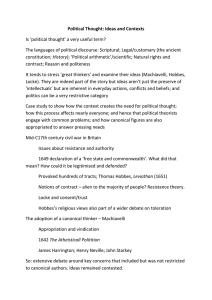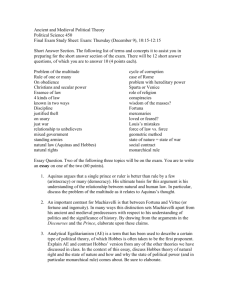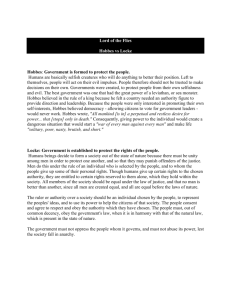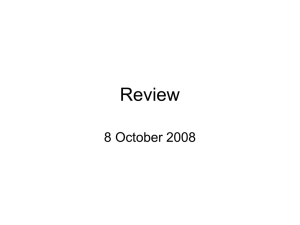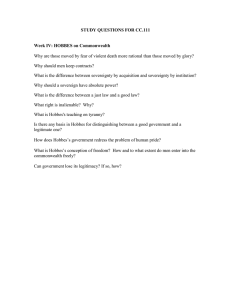PAPER ASSIGNMENTS 21L450 LITERATURE AND ETHICAL VALUES SECOND PAPER ASSIGNMENT
advertisement
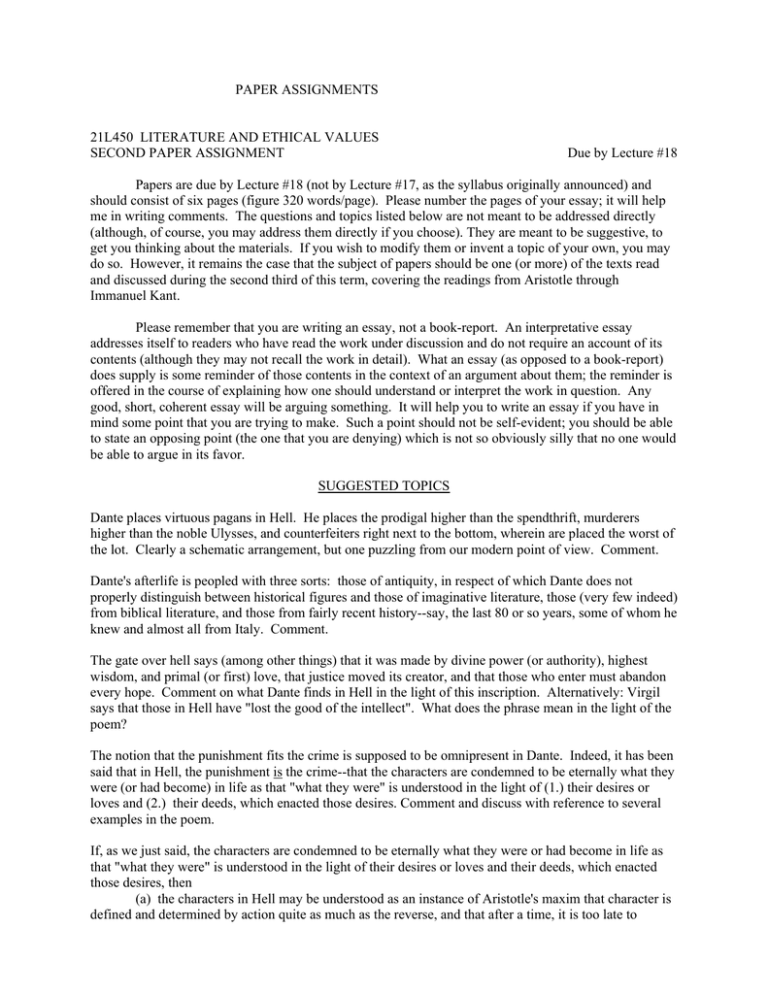
PAPER ASSIGNMENTS 21L450 LITERATURE AND ETHICAL VALUES SECOND PAPER ASSIGNMENT Due by Lecture #18 Papers are due by Lecture #18 (not by Lecture #17, as the syllabus originally announced) and should consist of six pages (figure 320 words/page). Please number the pages of your essay; it will help me in writing comments. The questions and topics listed below are not meant to be addressed directly (although, of course, you may address them directly if you choose). They are meant to be suggestive, to get you thinking about the materials. If you wish to modify them or invent a topic of your own, you may do so. However, it remains the case that the subject of papers should be one (or more) of the texts read and discussed during the second third of this term, covering the readings from Aristotle through Immanuel Kant. Please remember that you are writing an essay, not a book-report. An interpretative essay addresses itself to readers who have read the work under discussion and do not require an account of its contents (although they may not recall the work in detail). What an essay (as opposed to a book-report) does supply is some reminder of those contents in the context of an argument about them; the reminder is offered in the course of explaining how one should understand or interpret the work in question. Any good, short, coherent essay will be arguing something. It will help you to write an essay if you have in mind some point that you are trying to make. Such a point should not be self-evident; you should be able to state an opposing point (the one that you are denying) which is not so obviously silly that no one would be able to argue in its favor. SUGGESTED TOPICS Dante places virtuous pagans in Hell. He places the prodigal higher than the spendthrift, murderers higher than the noble Ulysses, and counterfeiters right next to the bottom, wherein are placed the worst of the lot. Clearly a schematic arrangement, but one puzzling from our modern point of view. Comment. Dante's afterlife is peopled with three sorts: those of antiquity, in respect of which Dante does not properly distinguish between historical figures and those of imaginative literature, those (very few indeed) from biblical literature, and those from fairly recent history--say, the last 80 or so years, some of whom he knew and almost all from Italy. Comment. The gate over hell says (among other things) that it was made by divine power (or authority), highest wisdom, and primal (or first) love, that justice moved its creator, and that those who enter must abandon every hope. Comment on what Dante finds in Hell in the light of this inscription. Alternatively: Virgil says that those in Hell have "lost the good of the intellect". What does the phrase mean in the light of the poem? The notion that the punishment fits the crime is supposed to be omnipresent in Dante. Indeed, it has been said that in Hell, the punishment is the crime--that the characters are condemned to be eternally what they were (or had become) in life as that "what they were" is understood in the light of (1.) their desires or loves and (2.) their deeds, which enacted those desires. Comment and discuss with reference to several examples in the poem. If, as we just said, the characters are condemned to be eternally what they were or had become in life as that "what they were" is understood in the light of their desires or loves and their deeds, which enacted those desires, then (a) the characters in Hell may be understood as an instance of Aristotle's maxim that character is defined and determined by action quite as much as the reverse, and that after a time, it is too late to change--one has become what one is for good. (Cf Nic. Ethics, Bk III, ch. v.) Perhaps in Dante's view Aristotle, who lived before the redemptive acts of Jesus, gave an account of the representation of what things are like when the possibility of radical change and salvation was not understood or did not yet exist. (b) perhaps Dante, passing among the damned, sometimes responds to them in ways that shows the possibility that he might share their fate. Dante's interaction with the dead is most evident in Cantos V, X, XIII, XV, XVI, XXXII, and XXXIII. Comment on either (a) or (b) The Inferno suffers from an excess of beginnings. There is the prologue, there is the Ante-Inferno, there is Limbo, there is Dante's encounter with Francesca (who most clearly represents amore or love gone astray), there is the drama of the entry into the city of Dis, or Hell proper, when the journey moves from sins of incontinence to those of violence and fraud. Comment. We have noted that the three main divisions in HellCthe incontinent, the violent, the fraudulent follows Aristotle=s division (to some extent at least) between incontinence, viciousness, and bestiality, as outlined in the Ethics, VII, i. How do the punishments differ in these sections? What is the significance of the Wall of Dis, which divides Hell proper from the realm of the incontinent and the suburbs of Those who Stood for Nothing and the virtuous pagans? Take any three passages and discuss the nature of the eternal condition or punishment of those there, commenting on the presentation in any way appropriate. Choices to consider: the virtuous pagans, Francesca and Paolo (the adulterers), Farrinate and Cavalcante (the heretics), Ser Brunetto Latini (Dante=s old teacher), Ulysses and Diomedes (the false counselors), Ugolino (who was walled up with his sons and starved to death). As the protagonist of a comedy, which always grants special dispensation from harm and evil, Dante cannot be hurt by what he sees. Or can he? Anyway, he has Virgil to protect him. Or does he actually have to protect himself? And he is changed by what he sees--at the end of the poem, he participates fully in the judgement of the wicked (Ugolino), even though the tale told by the sinner is worthy of more pity than any other we have heard (and we hear nothing else about this sinner except his terrible suffering at the end of his life). Comment. In a passage in St Matthew (referred to in class but not in our readings), Jesus says to a young man who is wealthy: AIt is harder for a rich man to enter heaven than for a camel to pass through they eye of a needle. After hearing Jesus say this, the disciplines ask, "Who then can be saved (if not the rich)?" What is the point of this response? Fidel Castro, while visiting the USA a few years ago (he was admitted in order to give an address at the United Nations) referred to Jesus as a "revolutionary". How revolutionary are the teachings of Jesus in St. Matthew? Compare the view of mankind implied by the Sermon on the Mount and what is demanded of it ("Be ye perfect . . . ") with the view of Plato or of Hobbes. Machiavelli has often been accused of inconsistency. For example, he says (ch. XV) that a prince shouldn't worry if he incurs a bad reputation for those vices--breaches of faith, miserliness, etc--without which he might lose the state and yet he insists that the prince must always strive to appear to possess certain virtues, above all that of being religiously minded. Is there a contradiction here? Machiavelli says that people will believe someone who is known often to break his word because (a) you can always give good reasons for breaking your word; (b) people are "so ready to obey present necessities" that they allow themselves to be deceived. What is meant by "present necessities"? (Don't just say; give reasons for your interpretation, in the light of your understanding of the text.) Is the notion of "allowing yourself to be deceived" a coherent notion? Explain, and in doing so, elucidate what Machiavelli had in mind in the light of his whole argument. Why do people need the illusion, if not the reality, of the five qualities the appearance of which Machiavelli says that the prince must cultivate: mercy, sincerity (keeping your word), humanity (compassionate), forthrightness (without a hidden agenda), religiosity? (NB: the qualities differ slightly, depending upon what translation you read.) Machiavelli does not give reasons but he comments often upon "what most people are like". Do any of these comments explain the matter? Machiavelli did not publish this text but circulated it in a semi-public way, and there is ample indication that he meant it for publication. If the prince is supposed to cultivate the illusion of possessing these qualities, doesn't blabbing the need for this rather give the game away? Machiavelli's adage, "The ends justify the means," is justly famous, although he evidently did not say this (or its Italian equivalent) precisely. What he did say was rather that the actions of all men, and especially the actions of princes, are judged by results. He didn't, in other words, say that when actions are judged to be good or bad by their results that the judgement is ethically valid. But why not? If means are both instrumental and necessary for a good end aren't they, therefore, good? What does it mean to advise a chief executive that he must "learn how not to be good"? In what way is "learning" involved? Machiavelli advises the ruler to be both beast and human being. Is this like wearing two hats, one for the office and another for home? Can you put on and take off the hat of a beast at will? Compare the character of Brutus, Julius Caesar, with that of the ideal prince in Machiavelli. What does it mean to advise a chief executive that he must "learn how not to be good"? In what way is "learning" involved? Machiavelli advises the ruler to be both beast and human being. Is this like wearing two hats, one for the office and another for home? Can you put on and take off the hat of a beast at will? Compare the character of Brutus, Julius Caesar, with that of the ideal prince in Machiavelli. Antony says of the conspirator that they are all "honorable men"? What is honor in this play? To what source of authority do the conspirators appeal? Is the conspiracy justified? In what respect are Brutus and Cassius similar? What are the major differences between them? Which of the two is more dangerous to established authority? In one sense, three of the people involved--Brutus, Cassius, and Caesar--are forever living up to an ideal of themselves. Antony, in contrast, seems to throw ideals to the winds in his passion for revenge. What ideals of themselves have Cassius and Caesar? Does the play endorse the notion of "living up to an ideal of yourself"? Is someone who lives up to an ideal of oneself simply a person who has swallowed his or her own public relations brochure? What advice would Machiavelli give to any of the four major characters in Julius Caesar? What do you think that he would take of the conspiracy as Shakespeare presents it? Suppose Hobbes were to read Julius Caesar. (He might have done--I just don't know.) What view do you think he would have taken of Brutus? Of Caesar? Suppose that Brutus or Caesar could have read Hobbes. (Rather unlikely.) What would they have thought of his view of human nature. (Don't give oversimple, obvious answers--e.g., Caesar was in favor of absolute sovereignty and therefore would have liked Hobbes--unless you can imagine how someone would object to the way in which you support your answer.) Apply Lord Acton's famous dictum--"All power tends to corrupt and absolute power tends to corrupt absolutely"--in any fashion that you please to Julius Caesar. Hobbes says that perhaps "there never was such a time" as the time that mankind lived in a state of nature (although "savage people in many places of America" come close) but that (1) we can see what kind of life this would be in civil war and also (2) in conflicts between nations. The "state of nature," then, isn't a historical concept; it does not refer to a historical time, in Hobbes view. What sort of concept is it? Hobbes writes of the natural condition of mankind (p. 715.) that it is a state war of "of every man against every man" in which "nothing can be unjust. The notions of right and wrong, justice and injustice have there no place". Is Hobbes correct about the absence of right and wrong in war? If the state of nature has no historical location, where is "there" in the sentence just quoted? "Of all voluntary acts, the object is to every man his own good," writes Hobbes (Chapter 15, in the paragraph on gratitude, and also where he says that charity and benevolence has as its end simply a relief from the uneasiness at witnesses the sufferings of others), and this holds for the exercise of all the virtues, that are possible only in the civilized state (which Hobbes calls the "civic state). The difference between the natural condition and the civilized condition makes no difference to the essentially self-interested nature of all human activity, in Hobbes's view. How is this view central to Hobbes's argument? Hobbes believes that all injustice is absurd--a form of self-contradiction, like affirming and denying the same proposition. How central is this belief to his view, as you understand it? Glaucon, near the outset of Plato=s Republic, presents an argument (just before he talks about the ring of Gyges) which sounds much like Hobbes=s argument. Socrates ultimately disagrees with Glaucon=s position. Compare Hobbes with either Glaucon=s notion or with Socrates=s in any way that seems useful for understanding Hobbes. Compare and/or Hobbes with Aristotle in any way that seems interesting.
